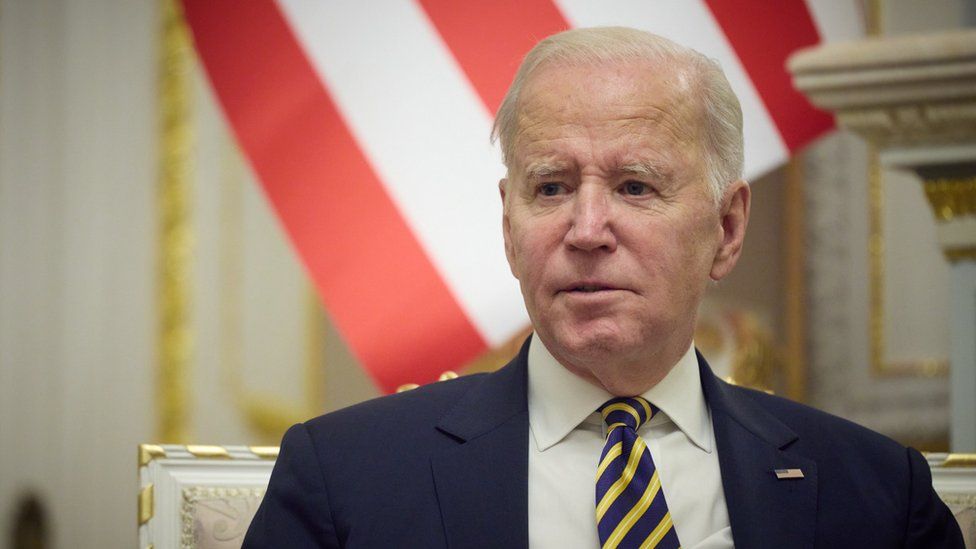Salem AlKetbi: Did the US diplomacy in Ukraine get it right?

A year after Russia’s war in Ukraine and during his recent visit to Kiev and Warsaw, US President Joe Biden doubled down on his rhetoric of dividing the world into good and evil, democrats and autocrats, calling anyone who questions the Western model a “tyrant” – a damaging characterization by any measure, as it puts, at sight, nearly half the world’s population at enmity with the Western world.
Remarkably, this division arose just after the coronavirus crisis, when the world suffered from the fact that America in particular, and the West in general, played no significant role either in procuring vaccines and medicines or in managing the crisis and trying to reduce its impact on national economies and peoples.
President Biden, who seeks a second term as US president, is of course trying to portray the US role in the Ukraine crisis as a political success for himself and his administration, which has faced several back-to-back failures since taking office, from the mismanaged troop withdrawal from Afghanistan to the failed effort to revive the Iran nuclear agreement.
It is hard to say that the Ukraine crisis is indicative of good Western governance. It was less about managing the crisis and more about providing military support to Ukraine without finding an appropriate way to resolve the crisis and without factoring in the possibility that the Ukrainian crisis could spiral out of control and lead to a full-scale military confrontation between Russia and NATO.
READ: Martin Jay: Dumb and dumber plan to bring peace to Ukraine
The fly in the ointment is that the US, which has unilaterally provided an estimated $29.8 billion in aid to Ukraine and chairs the Ukraine Defense Contact Group, is very intent on ensuring Russia’s defeat in this war. They show no de-escalation in seeking real crisis management.
Biden sees Russia’s situation now clearly as an opportunity to expand US hegemony and influence over the existing world order by inflicting a tactical defeat on the Russian army in Ukraine and ending the prospects of a Russian alliance with China, which poses the most visible strategic challenge to American power.

Biden has unmistakably switched his position in the first months of the war, from calculated and cautious military support for Ukraine to visiting Kiev and declaring all-out military support for the US, making it a military proxy for NATO against Russia. So, the US leadership in this crisis comes off as pure irrational, pursuing something that could plunge the whole world into a real disaster, especially if the conflict in the Taiwan Strait erupts in parallel, amid stirrings of provocations and a constant projection of American power in the Taiwan Strait. The facts confirm that there was no genuine American diplomacy in the Ukraine crisis.
What there was was an American command of the Western camp in this war. No diplomacy and no efforts to manage the crisis were made. Any door that might open to dialogue was shut blindly as an unconditional insistence on victory over Russia went ahead along a media campaign to market and justify the Western position under the pretext of protecting freedoms and the international order. Forget about the risk of the collapse of a major international nuclear power the size of Russia.
READ: John Wight: Russian offensive will determine more than just outcome of the war
At stake is not only Russia’s strategic position, but also the position of its president, Vladimir Putin, who will certainly not accept reaching the tipping point because it will be the end point of his political life and legacy. Therefore, it is possible that he will resort to all elements of strategic power of his country’s army to prevent a scenario of defeat.
Right now, President Biden’s diplomacy focuses on leading the West and dividing the world along the lines of “us versus them,” much like George W. Bush Jr. Did after the Sept. 11 terrorist attacks. While there are some who thought American action was justified at that historic moment when the greatest power suffered an unprecedented blow from terrorism, what is happening now seems wrong-headed to many experts and pundits, or at best will not lead to stability in the world. Nor is it in the interest of the US, either in the short or long term.
Cutting more than half of the world’s countries out of the democratic camp and branding them as authoritarian and tyrannical will only hasten the emergence of a new world order led, or at least shaped, by greater influence from the countries Biden rules out of his worldview.
The author is an UAE political analyst and former Federal National Council candidate
Want to chase the pulse of North Africa?
Subscribe to receive our FREE weekly PDF magazine












